SEO or Search Engine Optimization is something that every real estate professional heard about. However, only a select few have decided to master the necessary skills and implement the best practices for their online presence. The truth is more that 95% of real estate related searches start online. And if you can improve your real estate SEO game, you can help them find you.
Having a well optimized SEO friendly website is not only important but absolutely necessary for a real estate professional to future-proof their business. Real estate SEO can be tricky to learn if you are just starting out. However, when you understand the basics of search engine optimization, you can easily use it to your advantage.
In this real estate SEO guide we will cover everything you need to know so that the search engines will love you.
Ultimate Goal of Real Estate SEO
The ultimate goal that you should focus on from day one is to create the most useful local content for your area. This is because you’re not likely to out-rank a major real estate brokerage on general real estate content. In the world of search engine algorithms, real estate is among the most competitive spaces. However, no major brokerage or firm has the bandwidth to take on your local community. What’s more, people in your area are looking for hyper local content. So, aim to add value and start on a local level.
But how does that help my real estate business?
Well, you must be wondering how creating local content on your website is directly going to benefit you with new customers. This is one of the most talked about subjects in the world of digital marketing. There is an old saying “content is king”. It still is.
When you start publishing articles about your local restaurants, local businesses, local events etc. you are providing direct value to your community. What you are trying to do is build a niche website that has nothing to do with real estate (not yet) but simply a reliable source for locals to visit and get the most useful information that they can find on the internet about their area.
Once you start getting traffic and we mean relevant traffic on your website from organic search results you now have their attention.
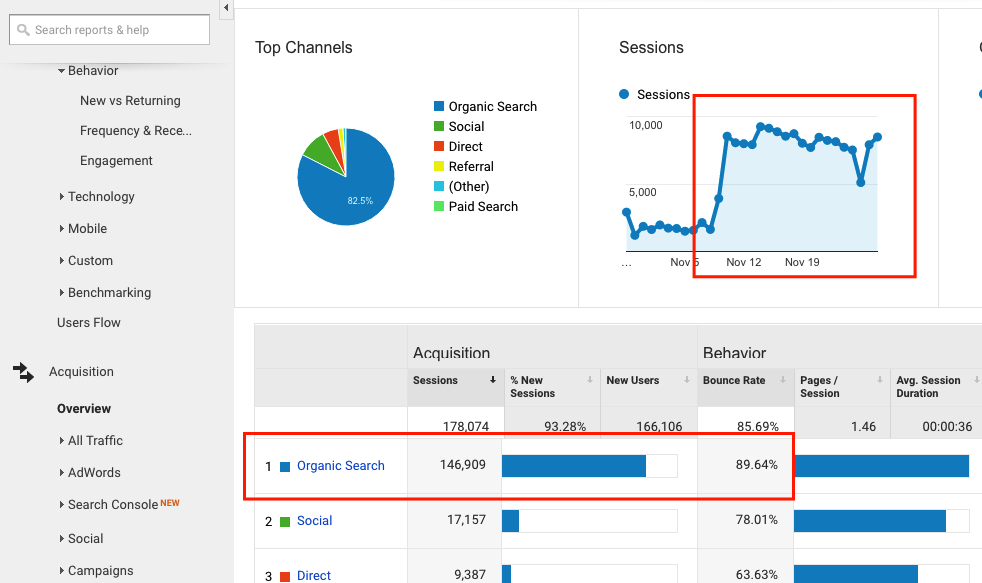
Attention is considered the most valuable commodity on the internet. From the moment you go online, each and every website is trying their best to grab your attention.
When you have a steady source of traffic that likes your content they will be compelled to hear what you have to offer. In this case your real estate services in the local area.
So, how do you start optimizing your website for better search results?
Before we dive into further details you need to understand that SEO is divided into two broader segments
- On-Page SEO – How well is your website optimized for the search engines.
- Off-Page SEO – Other factors like site authority, backlinks etc. that determines your website ranking in the search results.
Submitting Your Website To Google Search Console
If you have not already submitted your website to Google Search Console you must do so immediately. Google Search Console allows you to track how your website is performing in Google Search as well as how well your website is optimized for SEO.
Getting Started With Search Console:
- Go to Google Search Console
- Sign in with your Google Account
- From the top click on “Add A Property”
- Enter the URL of your website
- You will be greeted with a bunch of ways to verify your website.
- We recommend you connect Google Analytics to verify or install the HTML code on your website.
- Click on the red verify button to verify your website.
Note: Verify both www and non www versions of your website.
Adding Your Sitemap To Google Search Console
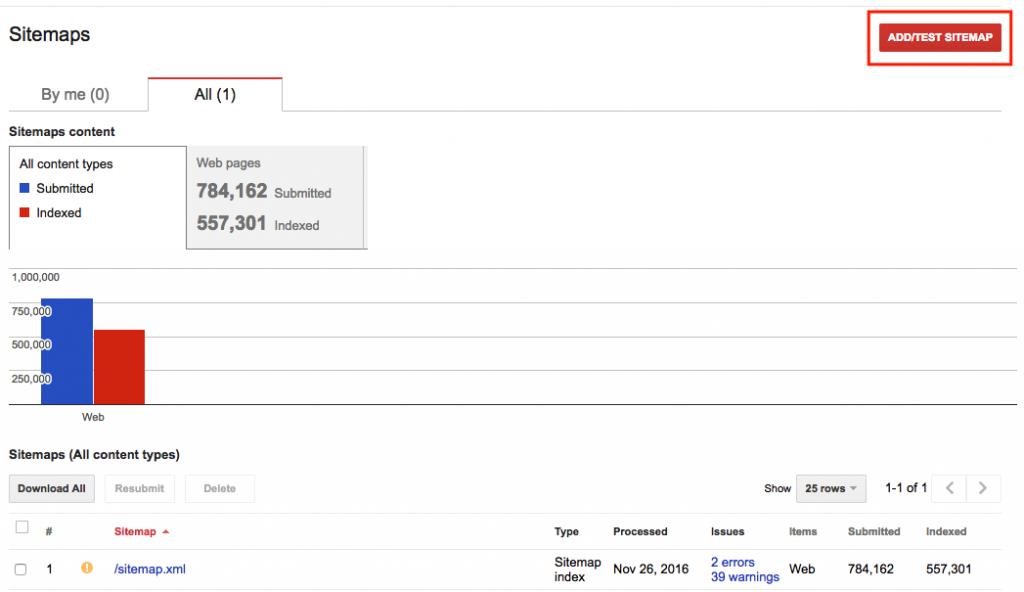
Once you have verified your website the next step is to submit the sitemap to Google Search console so that the crawlers can pick up your website and show you relevant data.
- Go to Google Search Console and click on your verified website from the dashboard
- Click on Sitemaps > Add/Test Sitemaps
- Enter the URL of your sitemap and click on Submit Sitemap
- Once you submit your sitemap it might take up to 48 hours for Google to verify and start crawling it.
Once your sitemap has been verified you will see a graph that represents how many URL’s have been crawled by Google.
Other Valuable Insights From Google Search Console
Google Search console gives you lots of insights related to on-page and off-page SEO. If we were to talk about all of them it would be a complete guide itself. However, we will touch some key points that you should track in order to see how your website is performing in the search results.
From your search console dashboard for your website click on Search Traffic > Search Analytics. Here you will get a snapshot of all the keywords that your website is ranking for. You will also get an overview of impressions, CTR (click through rate) and total clicks from these keywords.
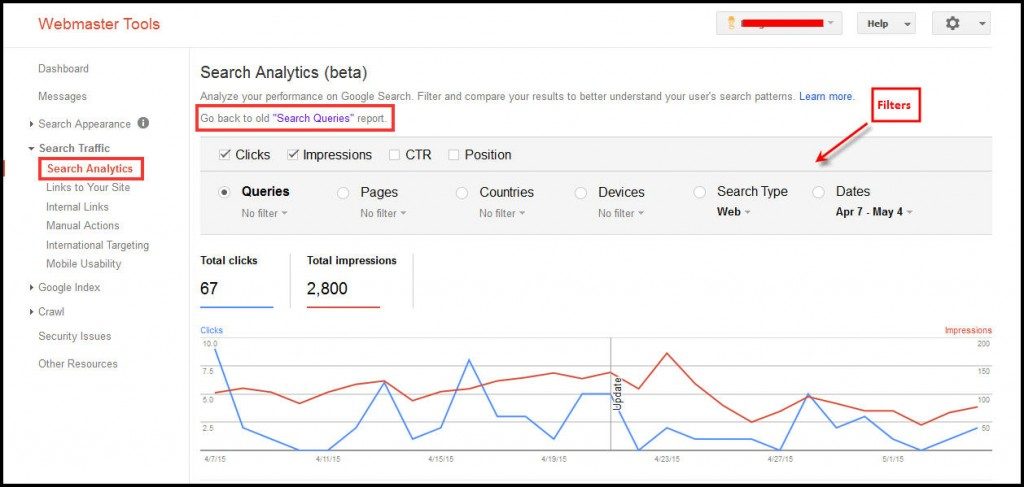
Another important metric to monitor inside your search console is links to your website. Go to Links To My Website tab where you will see how many backlinks you have and from which domains. This section also gives you a screenshot of which anchor texts are linking back from these domain names.
How to improve your On Page SEO of your Real Estate Professional Website?
In the beginning of this guide we mentioned that there are two parts to SEO. On page and off page.
Improving and tweaking the on-page SEO can yield results faster for your rankings.
There are several ways to improve on page SEO for a real estate website. What Google looks for is how useful the content in your website is for the keyword that a user has typed in the search bar.
5 Step Checklist For On Page SEO Optimization
Step 1: Implement Silo Architecture To Your Website
While the word “Silo Architecture” may sound very fancy it’s really easy to understand what it means and how your rankings benefit from it.
- The website should have a trickle down navigation allowing anyone to navigate to any page within 2 steps.
- When you are writing a blog post the heading should always be an H1 tag followed by H2 tags for subheadings and so forth.
- The blog posts should have relevant internal-linking as well as justified outbound links.
- The URL structure of the website should closely match the main navigation structure.
- URL’s should contain main keywords.
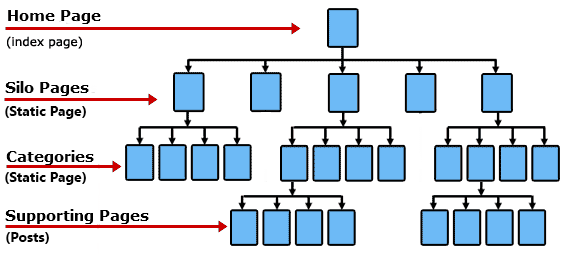
Step 2: Improve Website Speed
Website speed is considered one of the top factors for on page search engine optimization. A few tips for making your website faster includes:
- Optimizing images by using a compress engine (ask your developers if you need help)
- Lightweight and clean coded webpages. Minify javascript and css files.
- Disable all plugins if you are running WordPress that takes up a lot of resources.
- A better web hosting company. Are you using GoDaddy or any one of those standard web host? Time to think about an upgrade. Switching the web host can improve your site speed dramatically.
Check your website speed at: https://tools.pingdom.com/
Step 3: Optimize MLS Listing Pages
Almost all Real Estate Professionals use MLS IDX data on their website to showcase their listings. A listing page follows the same format for every property. This is where you need to ensure that the template for your listing page is well optimized allowing you to rank for multiple long tail keywords.
Things to do for optimizing your listing page:
- All images should be optimized. Image alt tags might contain property name & area.
- The full address of the listing should be visible and clear on top of the page.
- Template For Listing Page: [Property Address Full] Area – Your Website Name
- Use schemas to provide valuable information to Google. Click Here to learn more about Schema.org markups and how it can improve your SEO.
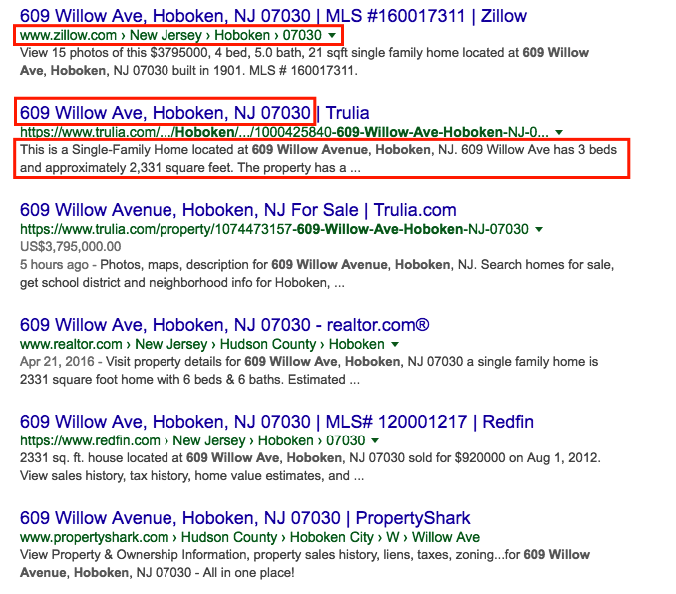
Check out how zillow and trulia uses the specific keyword in title tag, URL as well as meta description.
Step 4: Getting Backlinks To Your Real Estate Website
When a website links back to your real estate site from any of their pages it is called a backlink. Getting high quality and relevant backlinks is a proven method to help increase your rankings in Google.
The question is, how do you get backlinks from other websites?
There are a few tried and tested methods that works especially in the real estate industry for getting backlinks:
- Write about local businesses in your area. You can write an article about the top 10 restaurants in your neighborhoods.
- Reach out to these local businesses owners and ask them to link back to your website. They will happily do it since you are including them in your article about the neighbourhood.
- Another easy way of generating lots of backlinks is to include your website URL in each and every social media profile. When you join a real estate forum, complete your bio. Add a link to your website from each and every one of these forums.
- Commenting on real estate based news and blogs that has a website field in the comments section is also a commonly used method to get backlinks.
- Guest posting on different websites in your area and linking back to your website.
Weekly Plan For Real Estate Professionals to generate tons of backlinks
- Comment on 1 blog post each day. Stick to news sources, blogs and articles about the housing market, home decor and general real estate. (7 comments a week – 15 minutes in total)
- Optimize all your social media profiles with links back to your website. Join all the social media platforms that you are currently not a member of.
- Write 1 guest post each week and publish it on a relevant website. (2 hours a week)
- Write 2 – 3 blog posts a week on your own website about your neighbourhood. ( 2 – 3 hours a week).
If you follow the above blueprint and keep consistent then you will definitely see results within 60 days.
Step 5: Diavow Bad Links To Improve Search Rankings
You have a real estate website and the backlinks that your website should get must be of some quality. Any form of spammy back linking always hurts your SEO in the long run.
A lot of Real Estate Professionals try to generate backlinks by paying someone money for thousands of links. These type of techniques might give you some short term traffic but reduces your chance of becoming the authoritative website in your area in the long run.
Let’s say you did try these spammy link building techniques. What do you do now?
The good news is Google gives you a chance to disavow entire domains. This means if you upload a list of all websites that are linking back to your Real Estate site which you don’t want to be considered as a backlink, you can do so.
Steps for setting up Google Disavow in Search Console:
- First and foremost go to your search console and try to find out any spammy links from the “links to my site” tab.
- Another useful free tool to check backlinks is Moz Open Site Explorer.
- Whenever you see a website linking back that looks spammy or has a lower domain authority/ site authority in Moz include it in a text file.
- When you have a list of all the backlinks you want to disavow head to https://www.google.com/webmasters/tools/disavow-links-main
- Follow the instructions and upload your .txt file to disavow links.
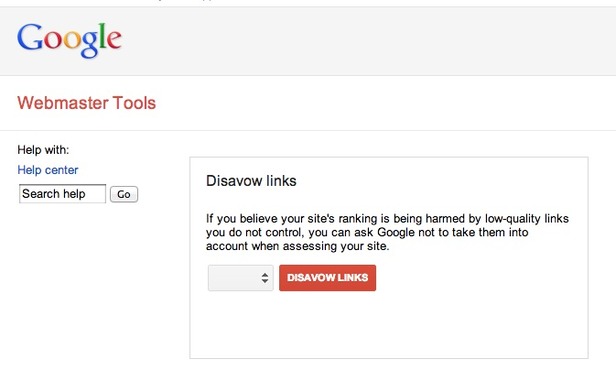
Special Note: Disavow links is an advanced SEO feature and should only be used once you have a clear picture of which links are hurting your SEO. If you insert backlinks that are of high value to your rankings into the text file it might backfire on your SEO strategy.
Social Signals For Improving Your Real Estate SEO
These days Google actually tracks your social presence and considers it as a factor when ranking your content. This means if you really want to improve your results you need to engage your potential visitors on the three main social platforms (YouTube, Facebook and Twitter).
Create content that people are likely going to share in order to improve your social signals. List based posts like top 10 things, 5 best late night places etc. works best.
Share and tweet mentioning popular people in your community to quickly get followers.
It is still not clear how Google uses social signal as a ranking factor. General trend suggest the bigger your sphere of influence across all social channels the better your ranking will be for a keyword.
Do Keyword Research For Real Estate Related Keywords In Your Area
The most important off page SEO factor that will determine the success of your real estate website is how well you conduct your keyword research.
Keyword research allows you to get valuable insights into which keywords people are searching for your area and what kind of SEO competition it possess.
If you are looking for a free keyword research tool then the go to platform would be Google Keyword Planner found under Google Adwords.
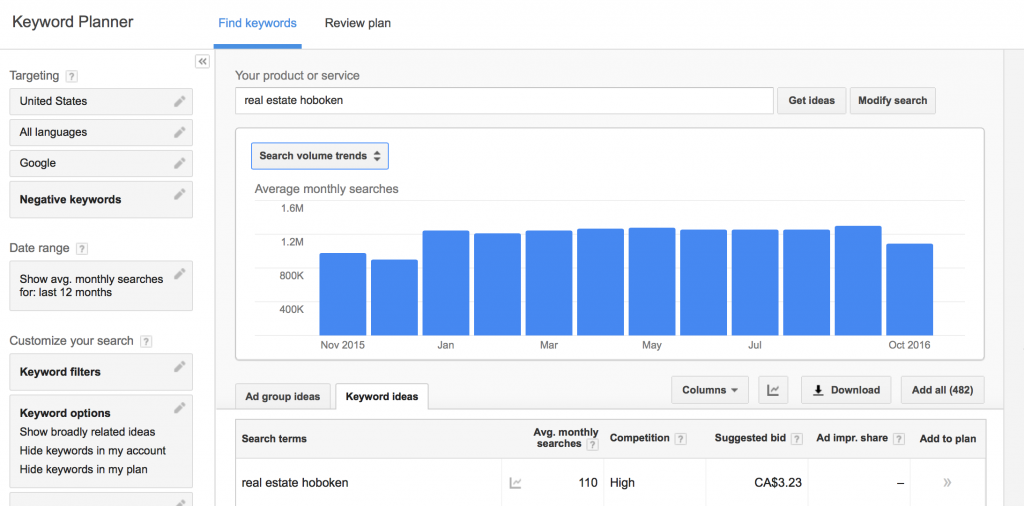
You might need to create a Google Adwords account in order to access the Keyword Planner found the Tools tab on top.
Another popular option is SEMRush that we personally use while researching our own blog posts.
Each keyword in SEM Rush shows you which websites are ranking for it and what kind of competition as well as monthly searches you can expect.
Your goal should be to rank between position 1 to 3 for long tail neighbourhood keywords.
Example Target Keyword: best Italian restaurants in Liberty Village Toronto
Inside Google Keyword planner try to search for keywords that have at least 3 phrases or more. These are called Long Tail keywords and they are the easiest to rank.
Do not take the competition factor into account when writing articles for SEO because that metric is geared towards advertiser bidding.
How To Engage With Your Organic Traffic – Pitching Real Estate
If you have followed our guide up to now you should be getting more organic traffic within weeks of implementing all the techniques we talked about.
So, how do you engage with this traffic coming to your website?
Let us introduce you to the popular 80/20 rule of content marketing….
20 percent of your blog posts or webpages will bring in 80 percent of revenue. It’s a model that has been proven for virtually each and every business with a dominating online presence.
Check out this awesome article from problogger about the 80/20 rule and how you can leverage it to your advantage.
From here on, you need to monitor your traffic in Google Analytics and analyze which of your blog posts are working better.
The three key metrics to look inside Google Analytics are:
- Bounce Rate – What percentage of people are leaving your website after landing on the initial page. (lower the better)
- Time on Site – How much time on average each visitor is spending on your website.
- Acquisition Tab – Inside the Google Analytics acquisition tab find out what percentage of traffic is coming from organic vs social media and which pages are getting the most views.
Once you play around with Google Analytics you can plan your next steps in terms of writing blog posts.
So, you have a content strategy in place. Now let’s get some leads out of your organic traffic.
Getting Buyer and Seller Leads For Your Organic Traffic
First and foremost each and every blog post should have a sidebar with your picture, phone number and a call to action button.
The call to action should say something like “Looking For Real Estate Service”, “Looking To Sell Your Home?” etc. so that the visitor will click through to your landing page.
The broader goal with Real Estate SEO is to ensure that your website starts becoming a source of useful local information that visitors find over and over again when they search you on the search engines.
Another key role is to optimize your About Me page. Add a very descriptive bio with links to your phone number and email. This page is kind of a resume for you because when people are interested in hiring a real estate agent they will search you on Google first.Some testimonials on the real estate about me page also works.
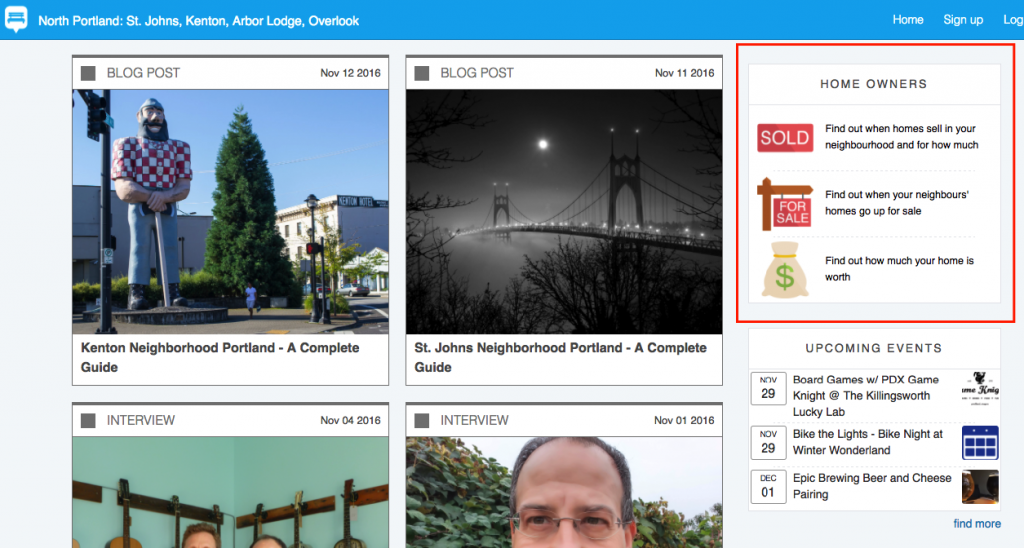
In Conclusion
SEO is something that takes time and constant effort to see results. You need to think about the long term plan and how your website can contribute with useful information about your community.
The end results are quite rewarding. Digital marketers across the globe still perceive organic traffic to be more valuable than paid leads.






